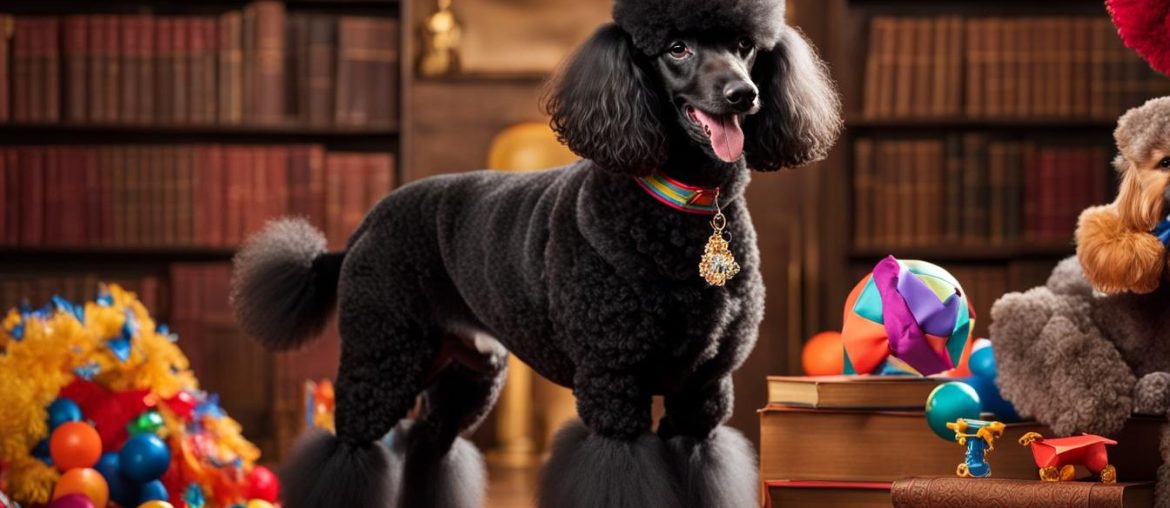Welcome to the world of poodles, where intelligence meets charm and playful exuberance. In this article, we will explore the fascinating personality of poodles, their unique temperament, and the behavior that sets them apart as a breed. Whether you are considering bringing a poodle into your family or simply curious about these incredible dogs, this article will provide you with valuable insights into the poodle’s character and disposition.
Key Takeaways:
- Poodles are highly intelligent and known for their trainability.
- They have a lively, active, and fun-loving nature.
- There are three sizes of poodles: standard, miniature, and toy, each with its own unique temperament.
- Poodles require regular exercise, grooming, and socialization to thrive.
- They make excellent family companions and can adapt well to different living environments.
Poodles: Lively, Active, and Fun-Loving
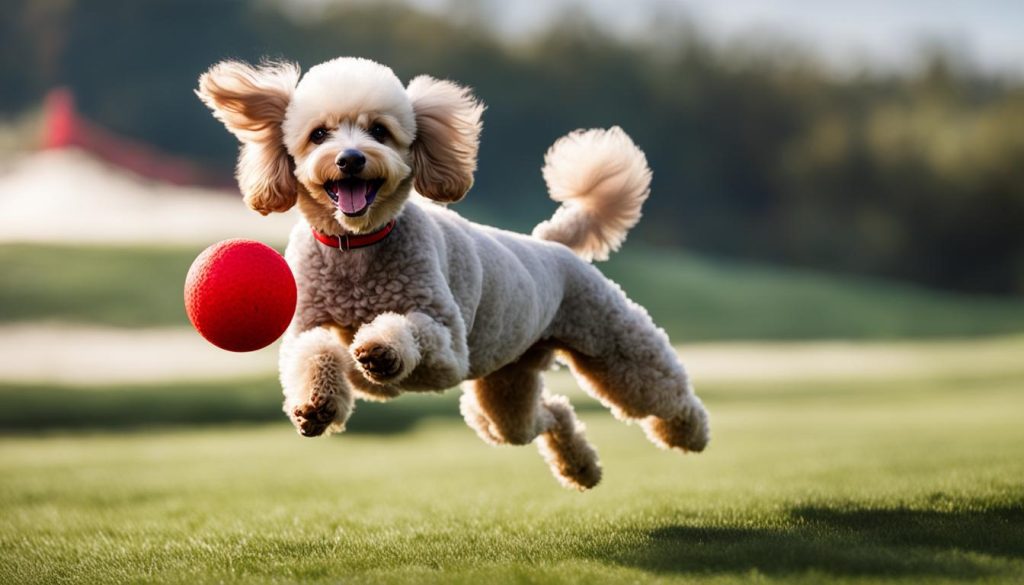
Poodles are notorious for their intelligence and ease of training. They are lively, active, and fun-loving dogs with a sense of the ridiculous. Poodles thrive on attention and can develop bad habits such as nuisance barking if ignored or left alone. They have a strong bond with their families and can be protective of their homes. Poodles are essentially hunting dogs and require exercise and training to be at their best as companion dogs.
When it comes to intelligence, poodles are in a league of their own. They are often ranked as one of the most intelligent dog breeds. This intelligence makes them quick learners and eager to please, which makes training a delight. Poodles excel in obedience and agility competitions due to their ability to understand and execute commands with precision.
Despite their intelligence, poodles have a playful and mischievous side. They love to engage in interactive games and puzzles that challenge their minds. Their fun-loving nature makes them great companions for families with children or individuals who are active and enjoy participating in various activities with their furry friend.
| Characteristics | Description |
|---|---|
| Intelligence | Poodles are highly intelligent and ranked among the smartest dog breeds. |
| Trainability | They are easy to train and excel in obedience and agility competitions. |
| Playfulness | Poodles have a fun-loving nature and enjoy interactive games and puzzles. |
| Bonding | Poodles form strong bonds with their families and can be protective. |
Quote:
“Poodles are not only intelligent, but they also have a great sense of humor. They love to make their owners laugh and enjoy being the center of attention.” – Dog Trainer, Jane Smith
Overall, poodles are lively, active, and fun-loving dogs that have a unique combination of intelligence and playfulness. Their ability to learn quickly and their eagerness to please make them easy to train. Poodles are the perfect companions for families and individuals who are looking for a smart and entertaining canine friend. However, it’s essential to provide them with plenty of mental and physical stimulation to keep their lively spirits satisfied.
Poodle Temperament: Intelligent and Trainable
When it comes to temperament, poodles are in a league of their own. These dogs are renowned for their exceptional intelligence, which makes them highly trainable and adaptable to various environments. Poodles possess a natural curiosity and eagerness to learn, making them quick learners and excellent companions for individuals or families.
The level of intelligence exhibited by poodles allows them to pick up commands and tricks effortlessly. Their ability to understand and respond to training makes them a popular choice for obedience competitions and agility trials. Poodles thrive on mental stimulation, and engaging them in challenging activities helps keep their minds sharp and wards off boredom.
While their intelligence is a remarkable trait, it also means that poodles can display stubbornness at times. Their cleverness enables them to test boundaries and push limits, which is why consistent and firm training is vital. Establishing clear rules and providing positive reinforcement is crucial in shaping their behavior and ensuring they remain well-behaved companions.
Poodle Intelligence and Temperament in Action
“Poodles are like little geniuses. They have an uncanny ability to understand what you want them to do and figure out how to do it. Their intelligence and trainability make them the perfect partner for any training activity.”
To emphasize the intelligence and trainability of poodles, consider the following table:
| Poodle Intelligence and Trainability | Notes |
|---|---|
| Quick Learners | Poodles have a remarkable ability to pick up commands and learn new tricks with ease. |
| Problem Solvers | Their intelligent nature enables them to think critically and find solutions to challenges. |
| Adaptable | Poodles can easily adjust to new environments and excel in various training activities. |
| Responsive | They are highly attuned to their owners’ cues and respond promptly to commands and signals. |
With their exceptional intelligence and trainable nature, poodles make outstanding companions for those seeking a loyal and intellectually stimulating canine partner.
Poodles: Three Sizes, Three Personalities
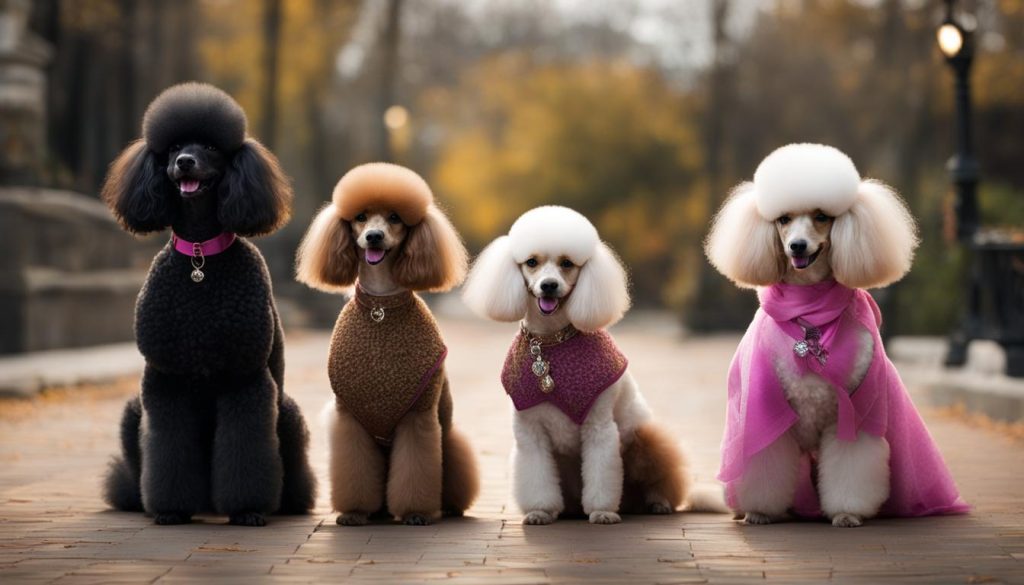
When it comes to poodles, size does matter. The three different sizes – standard, miniature, and toy – each have their own distinct personalities. While all poodles share common traits such as intelligence and trainability, their size plays a significant role in shaping their temperament.
Standard Poodles: Energetic and Reserved
Standard poodles, the largest of the three sizes, are energetic and require ample exercise to be happy and content. They have a reserved nature, which can make them a bit more composed and less outgoing compared to their smaller counterparts. Standard poodles are known for their dignified demeanor and make excellent companions for active individuals or families.
Miniature Poodles: Active and Devoted
Miniature poodles, on the other hand, are highly active and love to be the center of attention. They are often described as devoted sidekicks, following their owners around with unwavering loyalty. With their playful and affectionate nature, miniature poodles are an ideal fit for families with small children. Their size makes them adaptable to both indoor and outdoor living environments.
Toy Poodles: Mischievous and Adorable
Toy poodles, the smallest of the three sizes, are known for their mischievous and adorable personalities. They may be small in stature, but they make up for it with their big personalities. Toy poodles are highly intelligent and enjoy being the center of attention. They are typically more suited for individuals or families without small children, as their delicate size requires extra care and attention.
| Poodle Size | Personality |
|---|---|
| Standard Poodles | Energetic and Reserved |
| Miniature Poodles | Active and Devoted |
| Toy Poodles | Mischievous and Adorable |
While these generalizations provide a broad overview of the different poodle sizes and their corresponding personalities, it’s important to remember that individual poodles may exhibit unique characteristics. Each poodle has its own distinct temperament that is shaped by a combination of genetics, socialization, and environment. When choosing a poodle, it’s essential to consider your own lifestyle, preferences, and the specific needs of the size you’re considering.
Poodle Care and Expectations

Poodles are a delightful breed with unique care needs. To keep your poodle happy and healthy, it’s important to provide the right grooming, exercise, and socialization. Understanding their characteristics will help you give your poodle the care it deserves.
Grooming:
Poodles have a distinctive curly or wavy coat that requires regular grooming. They are a hypoallergenic breed, which means they shed less and are suitable for people with allergies. However, their dense, curly coats can easily become tangled and matted if not properly cared for. Regular brushing helps prevent mats and keeps their coat looking its best. Additionally, poodles require regular professional grooming to maintain their signature hairstyles. Show coats require more frequent grooming than pet trims. Maintaining good dental hygiene, such as regular teeth brushing, is also essential for poodles.
Exercise:
Poodles are an active breed and require regular exercise to stay healthy and happy. Daily walks, playtime, and mental stimulation are important for their well-being. They enjoy activities like agility, obedience training, and retrieving games. Poodles thrive in environments where they can engage in physical and mental challenges. However, it’s important to tailor their exercise routine to their size and age. While standard poodles need more exercise and space to run, toy and miniature poodles can get sufficient exercise indoors with interactive toys and games.
Socialization:
Poodles are social dogs and thrive on companionship and attention. Early socialization is crucial to help them develop good behavior and adaptability. Introduce your poodle to various people, pets, and environments from a young age to ensure they grow up well-rounded and confident. Regular interaction with other dogs and exposure to different stimuli will help prevent anxiety and fearfulness. Poodles are highly intelligent and benefit from mental stimulation. Training sessions, puzzle toys, and interactive playtime can keep their minds engaged and prevent boredom.
In summary, caring for a poodle involves regular grooming to maintain their distinctive coat, providing proper exercise to keep them physically and mentally stimulated, and ensuring they receive early socialization for their well-being. When these care needs are met, poodles make wonderful companions and bring joy to families and individuals alike.
The History of Poodles
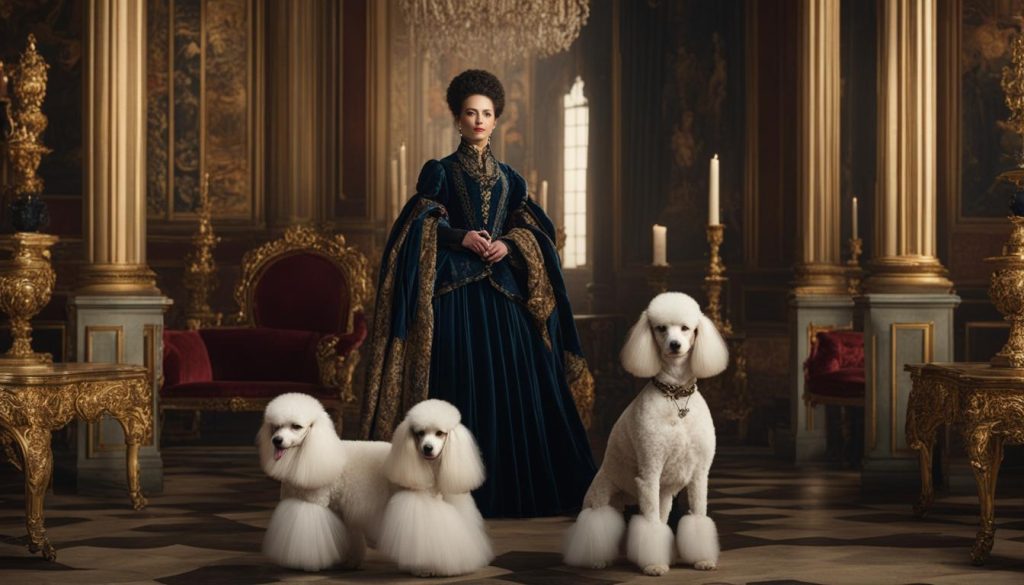
As I delve into the fascinating world of poodles, it’s crucial to understand their origin and how they became one of the most beloved breeds today. Contrary to popular belief, poodles did not originate in France, but rather in Germany. These elegant canines may have descended from the barbet, a water dog known for its excellent retrieving skills.
While poodles gained popularity in France and Spain, it was in England where they truly flourished. They transitioned from being hunting dogs to becoming highly talented performers in traveling troupes and circuses. Their intelligence, coupled with their desire to please, made them ideal candidates for these entertaining roles. Eventually, poodles captured the hearts of aristocracy, who adored their playful nature and unique hair coat, which led to their association with high society.
It’s worth noting that poodles are still referred to as caniches in France, which translates to “duck dog.” This name pays homage to their remarkable ability to retrieve waterfowl, highlighting their historical connection to their hunting roots. Today, poodles continue to charm and captivate us with their rich history and distinctive personalities.
The Evolution of Poodles
Over the centuries, poodles have evolved from skilled hunting partners to cherished companions. Let’s take a closer look at their fascinating journey through time:
| Period | Development |
|---|---|
| 15th century | Poodles’ ancestors, the barbets, were bred as water retrievers |
| 18th century | Poodles gained popularity in France as performing dogs |
| 19th century | Poodles became fashionable pets among European aristocracy |
| 20th century | Poodles’ versatility led to success in various fields, including showmanship, obedience, and agility |
| Present day | Poodles are cherished and adored by families worldwide as loyal and intelligent companions |
As the years passed, poodles have demonstrated their adaptability and intelligence, winning the hearts of people from all walks of life. From their barbet ancestors to their modern-day roles as cherished pets, poodles have truly come a long way.
Poodles as Family Dogs

Poodles make wonderful family dogs due to their temperament and behavior. They are known for being affectionate, intelligent, and playful, making them a great addition to any household. Poodles have a natural affinity for children and enjoy playing with them, which can create a strong bond between them. Their high energy levels and love for play make them perfect companions for active families.
One of the key traits that make poodles great family dogs is their intelligence. They are highly trainable and excel in obedience and agility. Poodles can learn commands and tricks quickly, making them a joy to train and interact with. Their intelligence also enables them to adapt well to different family dynamics and environments.
While poodles are loving and social animals, they do require plenty of exercise and mental stimulation to thrive. They are active dogs that need daily walks, playtime, and engaging activities to release their energy. Without proper exercise, poodles may become anxious or exhibit destructive behaviors. Additionally, socialization with other people and pets from a young age is crucial for their well-being, as it helps them become well-rounded and confident family members.
| Poodle Temperament | Behavior | Family Compatibility |
|---|---|---|
| Intelligent | Trainable | Excellent |
| Playful | Affectionate | Great |
| Social | Energetic | Perfect |
Overall, poodles are ideal family dogs due to their temperament, behavior, and compatibility with different households. Whether you have children, other pets, or live an active lifestyle, a poodle can be a wonderful addition to your family. Their loving nature, intelligence, and playfulness make them great companions for both adults and children.
Poodles: Active and Playful Companions
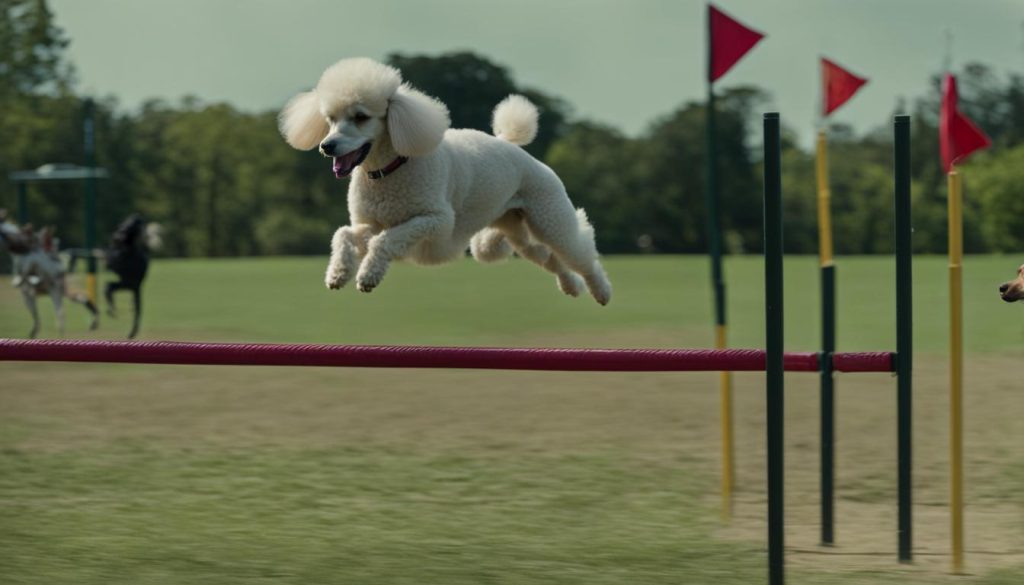
Poodles are known for their high energy levels and love for play. To keep them happy and healthy, they require daily exercise to release their energy and prevent boredom. Engaging activities like intelligence games, challenging toys, and daily walks or runs are essential for poodles’ well-being.
Standard poodles, in particular, need ample space to move around both indoors and outdoors. Without proper exercise, poodles may become anxious or exhibit destructive behaviors. Smaller breeds like toy and miniature poodles can thrive in apartments as long as they have enough mental and physical stimulation indoors.
Recommended Activities for Poodles:
- Interactive puzzle toys
- Hide-and-seek games
- Fetch and retrieve
- Agility and obedience training
- Swimming
- Joining dog sports clubs
“Regular exercise is crucial for poodles to maintain their physical and mental well-being. They are active, intelligent breeds that thrive on mental stimulation and physical challenges. A tired poodle is a happy poodle!”
Remember that poodles have various exercise needs depending on their size and individual energy levels. Always consult with a veterinarian or professional trainer to determine the appropriate exercise routine for your poodle, taking into consideration any specific health conditions or restrictions.
Poodles: Highly Intelligent and Trainable
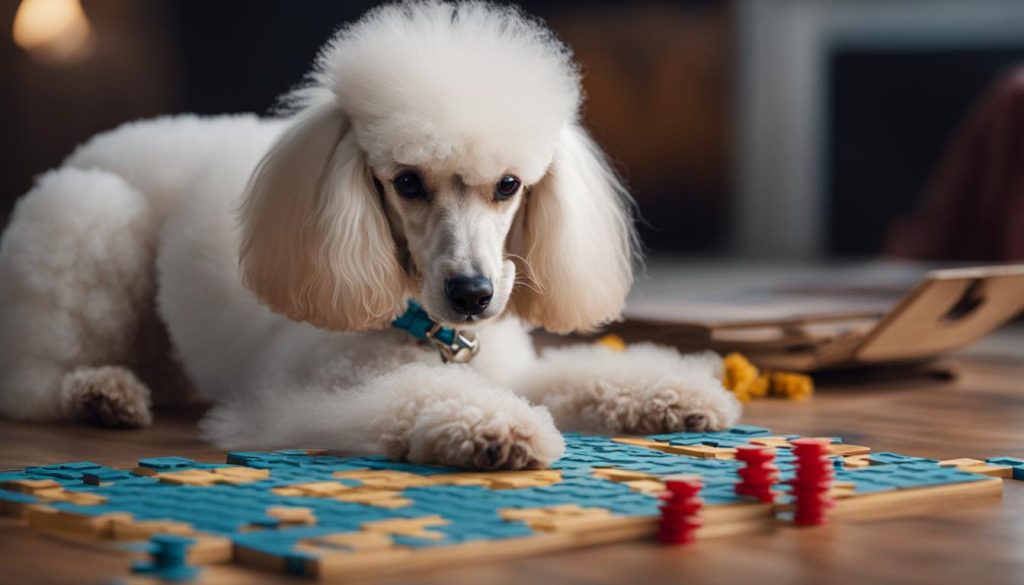
When it comes to intelligence, poodles are in a league of their own. With their sharp minds and eager-to-learn nature, they are considered one of the most intelligent breeds in the world. Poodle intelligence is evident in their ability to quickly pick up commands and tricks, making them highly trainable companions. Whether it’s mastering obedience skills or excelling in agility competitions, poodles are always up for the challenge.
What sets poodles apart is their remarkable trainability. They thrive on positive reinforcement and praise, making them responsive to training methods that focus on rewards rather than punishment. Their intelligence allows them to understand and adapt to new situations, making them versatile and adaptable pets. With consistent and firm training, poodles can become well-behaved and obedient members of the family.
Unleashing their Potential
Training a poodle is not just about obedience; it’s about tapping into their intellectual capabilities and providing them with mental stimulation. Poodles thrive when they are challenged and engaged, so it’s important to incorporate stimulating activities into their daily routine. Puzzle toys, interactive games, and learning new tricks can help keep their minds sharp and prevent boredom.
A Word of Caution
While poodles’ intelligence is undoubtedly impressive, it can also lead to a certain level of stubbornness and independence. They may test boundaries or try to outsmart their owners at times. To prevent behavioral issues, it’s essential to establish consistent rules and boundaries from an early age. With the right guidance, poodles can channel their intelligence into positive behaviors and become well-rounded companions.
| Key Traits of Poodle Intelligence and Trainability |
|---|
| Quick learners |
| Responsive to positive reinforcement |
| Adaptable and versatile |
| Require mental stimulation |
| Potential for stubbornness |
| Establish consistent rules and boundaries |
Wrapping Up
To summarize, poodles are truly remarkable dogs, known for their captivating personality and unique temperament. Their intelligence, exuberance, and playful charm make them a popular choice for families and individuals seeking a loyal and affectionate companion.
Whether you prefer a standard, miniature, or toy poodle, you can expect a dog that is highly trainable, eager to please, and devoted to their owners. Poodles thrive on attention and enjoy being the center of their family’s world.
While poodles do require specific care, grooming, and exercise, their remarkable intelligence and versatile nature make them well worth the effort. They are social dogs who prefer to be with people most of the time and can adapt to different living situations.
If you’re looking for a dog with a captivating personality, a poodle may be the perfect choice for you. Their unique combination of intelligence, energy, and affection make them wonderful companions for those seeking a loyal and entertaining four-legged friend.
FAQ
What are the different sizes of poodles?
Poodles come in three sizes: standard, miniature, and toy.
How much do poodles weigh?
Poodles can weigh between 45 to 70 pounds (20 to 32 kilograms) for standard size, 12 to 20 pounds (5 to 9 kilograms) for miniature size, and five to seven pounds (2 to 3 kilograms) for toy size.
What colors do poodles come in?
Poodles can come in any solid color, including white, black, gray, blue, silver, brown, and apricot.
How much exercise do poodles need?
Poodles require at least 40 minutes of exercise per day and have a high energy level.
What is the average lifespan of a poodle?
Poodles have an average lifespan of 10 to 14 years.
Do poodles bark a lot?
Poodles have moderate barking tendencies.
How much grooming do poodles need?
Poodles have moderate grooming needs.
How are poodles recognized by kennel clubs?
Poodles are recognized by the AKC as a non-sporting breed and by the UKC as a companion dog.
Are poodles easy to train?
Poodles are known for their intelligence and ease of training.
What is the history of poodles?
Poodles originated in Germany and gained popularity in France and Spain before becoming most popular in England.


